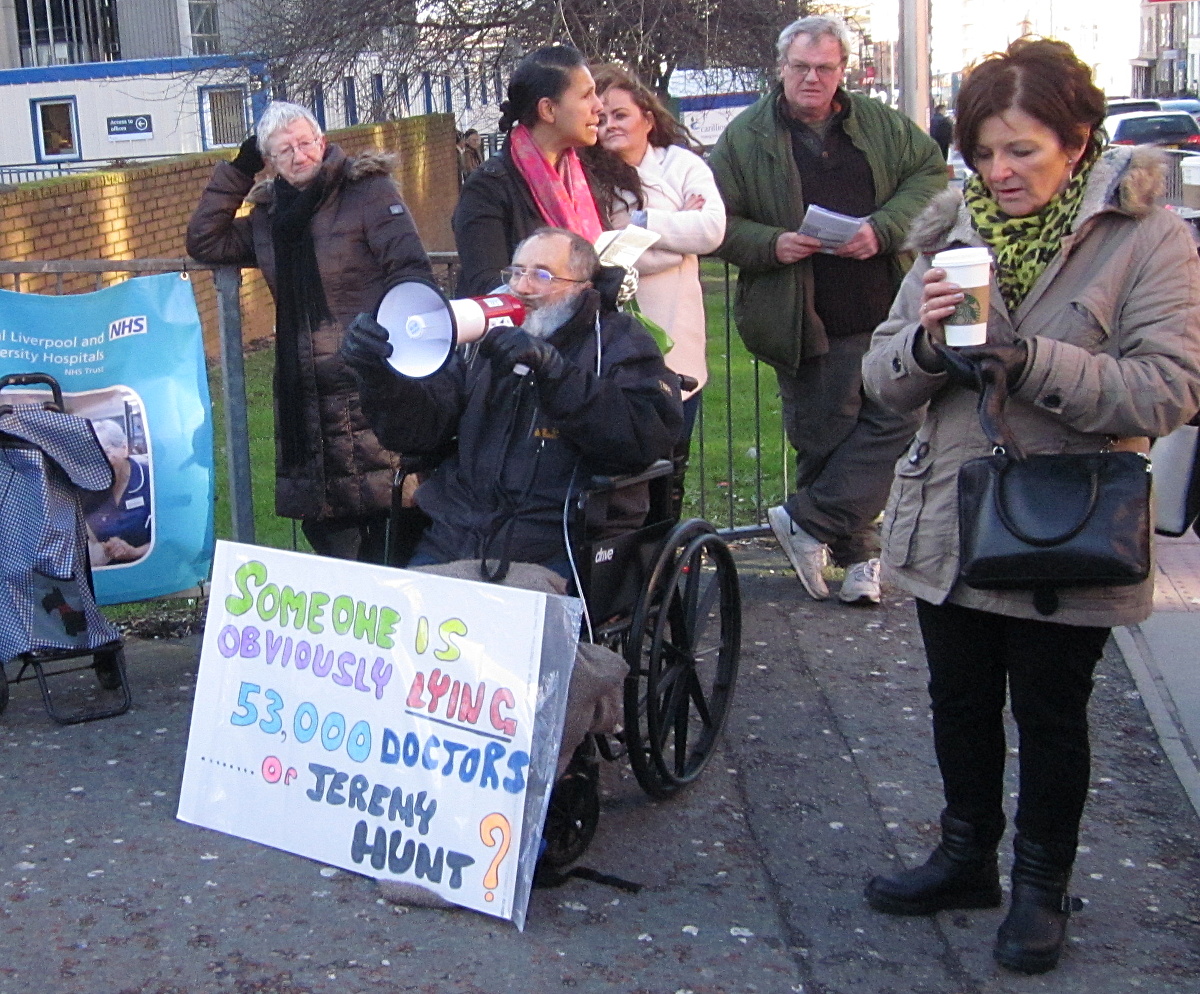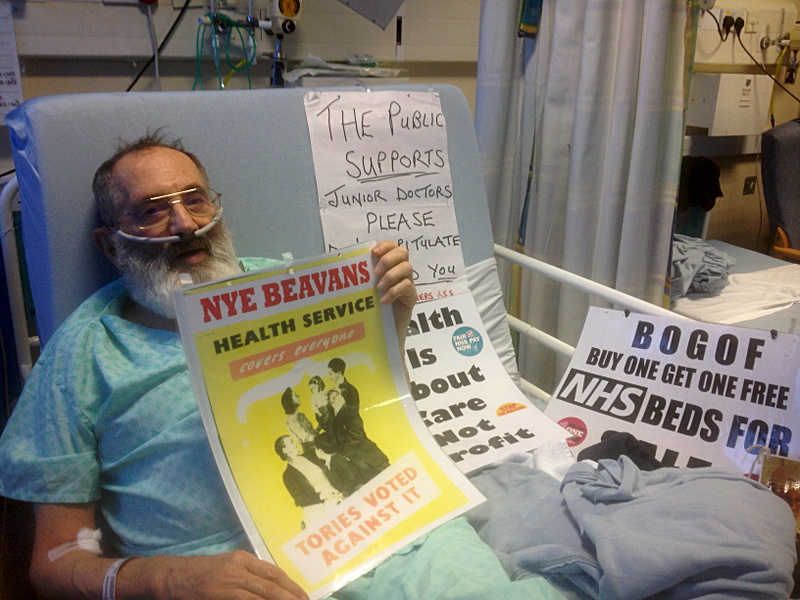 A coalition to defend #ourNHS |
||
Ron Singer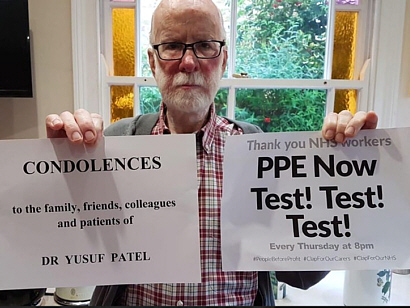
Ron campaigning Health Campaigns Together is saddened to hear of the death of Dr Ron Singer, a GP in East London and a longstanding activist. Ron was member from the earliest days of Keep Our NHS Public, chair of our affiliate group Newham Save Our NHS, and a member of Doctors in Unite (Unite the Union). KONP co-chair Tony O’Sullivan writes: “Ron was lovely, and wise, and such a generous friend and comrade. And, has been said, all with a lovely humour. He was very important for me as co-chair and for KONP amidst some divisiveness in the campaign - he offered, and we benefited from, simple helpful grounded advice. “It is such a hard time for everyone - no surprise Ron was campaigning to the end highlighting the desperate need for PPE for health and care staff and key workers. We will find it so much the harder to be without him. But we will continue in his memory and spirit strengthened by all he gave us. Our deep condolences and sympathy to Ron's partner Jan, their family and all in the Newham Save Our NHS campaign.” John Lister, editor of Health Campaigns Together adds “I have been lucky enough to have Ron Singer as a comrade and colleague throughout most of my years in health campaigning, and always found him the most dependable ally whenever we had to fight to keep campaigns united and focused. “The best tribute we can pay to him is to step up the fight to roll back privatisation of the NHS and reinstate it as a public service, with a post-Covid funding boost to tackle the growing waiting list.”
• • • • • • • • • • • • • • • • • • • • • • • • • • • • • • • • • • • • • • • • • • • • • • • •
Pete Gillard, April 2020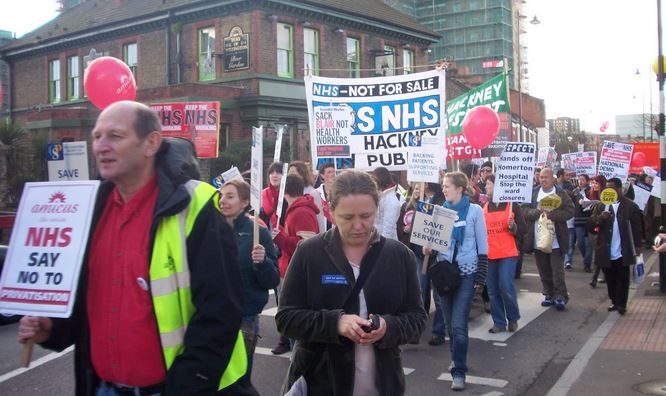
Pete on the march With great sadness, Health Campaigns Together bids goodbye to Pete Gillard, who died on 21 April. Pete was a tireless health campaigner, a lifelong socialist and trade unionist, Treasurer for Health Campaigns Together and an Executive Committee member of Keep Our NHS Public. He died some weeks after an operation for bladder cancer, after a spell in intensive care; tragically, his condition had appeared to be improving, until an infection (believed to be Covid-19) reversed this recovery and proved too much for his body to overcome. The hospital in which Pete died, Ludlow Community Hospital, is still open today in great part due to the brilliant 2017 campaign against its closure. Pete and other activists were at the heart of that victorious fight - but understood very well that strength lay in numbers. Ludlow Hospital is safe because of the size and breadth of the campaign to keep it. Pete was a founding member, alongside his partner Gill George, of Shropshire, Telford and Wrekin Defend Our NHS, which launched in March 2014 and quickly became a major force to be reckoned with at local level and a trailblazing outfit in national NHS campaigning. For the last 7 years, Pete's relentless energy and work ethic and his keen eye for detail were at the heart of the group's diligent and successful campaigns to defend local services against closures and centralisation. Pete combined an unshakeable political commitment to defending universal care with an alert eye for where real victories could be won. Pete had little interest in the politics of 'protest'. Defending the NHS was about making real gains and working alongside others to do this. Going down to glorious defeat doesn't build confidence. But stopping NHS cuts, stopping closures, safeguarding valued services: these successes make people feel strong, and enable them to stand up to the powers that be. Pete always believed that campaigning for the NHS was about ordinary people gaining the confidence to make their voices heard and their power felt. There was also a need, Pete believed, for absolute honesty. The NHS sometimes gets things wrong, and it is important for campaigners both to tell the truth and to demand better. In Shropshire, a small number of very brave bereaved parents battled for years for the truth following the avoidable deaths of their babies. The local hospital trust was dismissive. Parents were ignored. Babies were referred to as 'it'. The number of deaths was systematically concealed. Trite phrases about 'We've learned the lessons' were trotted out again and again - but babies continued to die. Pete and his partner Gill were proud to stand with parents and fight for change. The independent 'Ockenden Review' has yet to report, but this is set to be a scandal on a par with Mid-Staffordshire. Of course the Shropshire tragedies underline the need for adequate funding and staffing, but Pete recognised there were broader 'cultural' problems too. Women had to be listened to about their own health and needs; while the life and wellbeing of every baby had to be supremely important. And of course, when senior leaders at NHS organisations insist on hearing and telling only 'good news stories', it becomes close to impossible to learn from avoidable harm. In Shropshire, Telford and Wrekin, there is a discredited plan - 'Future Fit' - that aims to close one of two A&Es, downgrade one of the District General Hospitals, and reduce access to both acute and planned care. It was meant to be all done and dusted by 2015. Now, in 2020, it is a ramshackle mess of a project that remains very far from implementation. Shropshire, Telford and Wrekin Defend Our NHS has led the fight against Future Fit. Pete was central to the battle. He understood the need for detailed, careful work: for going to the long and boring meetings and reading the tedious documents. You have to know what health bosses are doing in order to challenge it effectively. There was a second equally important strand to Pete's approach, and to the wider philosophy of Defend Our NHS. Pete had an unswerving commitment to working with other people whenever there are areas of common concern. It makes no sense to defend an A&E or oppose a hospital closure only with people who believe the same things as you do or vote the same way as you. The experience of Shropshire shows it is perfectly possible to build successful and broad-based campaigns in small market towns and rural areas. Beyond his health campaigning activity, Pete was a committed socialist and revolutionary throughout his life. He joined the student wing of the International Socialists in 1969 while studying at Durham, and went on to be a member of its successor organisation, the Socialist Workers Party. He remained in the SWP until 2013, when he was part of a large group of activists who left the party and formed a new organisation, rs21 (Revolutionary Socialism in the 21st Century), which Pete was an active member of for the rest of his life. He was also active in socialist organisations in the United States (where he lived from the mid-1980s to the early 1990s) and in the Netherlands (where he lived thereafter until he returned to London in 1998). During his time in New York, he was active in solidarity with the ACT UP (AIDS Coalition to Unleash Power) movement, which was demanding action on the AIDS epidemic that was cutting a deadly swathe through LGBT communities at that time, with authorities adopting a posture of indifference. Pete was also a passionate internationalist and anti-racist - from his youth, when he fought against the far-right National Front as part of the Anti-Nazi League, to his later years, when he was a passionate opponent of the racist Hostile Environment regime that denies healthcare to many migrants and undocumented people in Britain. In the days since Pete's death, it has been crystal clear how many people found him to be an invaluable mentor and guide. Activist after activist, within Keep Our NHS Public, in the trade union movement and beyond, has recalled the care and dedication with which Pete assisted them in beginning their activity and mounting campaigns, and helped them to find their own confidence and capacity. With the formation of Health Campaigns Together from the end of 2015 Pete helped design a constitution to protect its character. He became key player in developing and strengthening its links with the unions, and a rock solid defender of the need to keep it as a coalition of organisations linked to, but not subservient to the health unions and other TUC unions, and while avoiding party political or adventurist leftist gestures that might imperil is hard-won base of affiliations or limit its scope and impact. Pete's generosity with his time and his ideas meant that he played a central role in cultivating multiple new generations of activists, who will carry on the fight that Pete himself has now, finally, departed. A more detailed biographical obituary has been published on the rs21 website by Charlie Hore, one of Pete's lifelong friends.
• • • • • • • • • • • • • • • • • • • • • • • • • • • • • • • • • • • • • • • • • • • • • • • •
Julian Tudor Hart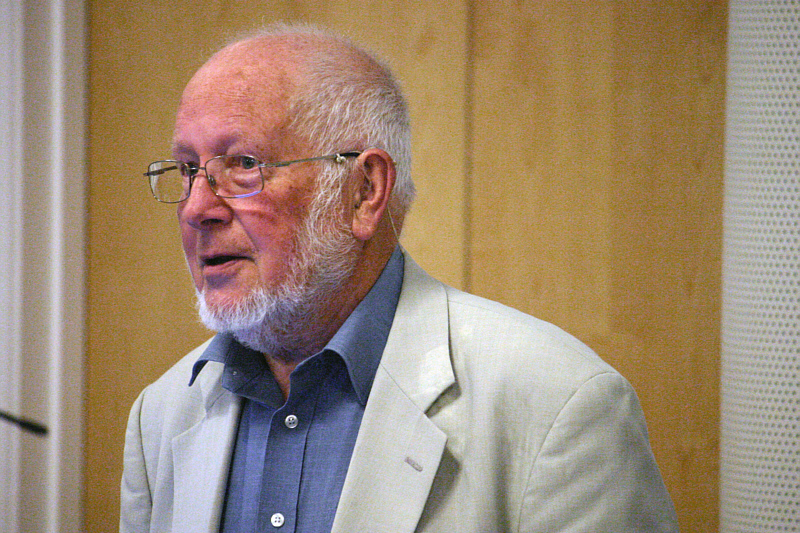
Julian Tudor Hart Dr Julian Tudor Hart, a founder member of the Socialist Medical Association and the first honorary President of the Socialist Health Association died on July 1, aged 91, in the week of the 70th anniversary of the NHS, which he fought so hard to improve and defend. His death is a sad loss to socialists and campaigners: but his life’s work has left us better equipped to address health inequalities, and to understand the weaknesses and contradictions that limit the effectiveness of the NHS. Although he was best known for the memorable phrase and approach of his 1971 Lancet paper on the "The inverse care law," Julian was at the same time a consistent and relentless critic of the impact of markets on health care. These were also central to the same keynote article, which appeared almost twenty years ahead of Margaret Thatcher’s government’s legislation establishing an “internal market” in the NHS. The opening abstract (summary) of that article is an example of Julian’s always compressed and lucid writing style and his skill in the brief exposition of a complex concept:
These linked themes, so succinctly set out in 1971, have formed a near constant focus for campaigners and progressive academics since the late 1980s. Indeed, the concept can be read more broadly to argue that those with the greatest health needs are almost always those least able to afford the market price of health care as a commodity (hence the absence of any health systems anywhere entirely based on free markets); and it can explain why those areas facing the greatest deprivation are always those with the least political power to force change. However, Julian in his later years was increasingly reluctant to refer to the inverse care law. We might say that the importance Julian himself attached to the concept and the phrase was inversely proportional to the common acceptance and use of the term. He argued that the inverse care law detached from the wider social and political critique was relatively trite and unimportant. He was angered by the ways in which the concept had been effectively devalued and hijacked by managers and establishment politicians seeking to claim a fig-leaf of concern for health inequalities while pressing forward with policies to deepen and entrench the purchaser/provider split and market mechanisms in the NHS. For Julian, the key question was not neat phrases and clever argument, but testing and proving ideas in practice, improving not only the work of GPs but the social and organisational context in which they worked. He worked for 30 years as a general practitioner in a health centre in Glyncorrwg near Port Talbot in South Wales, which became the first recognised research practice in the UK and pioneered the regular monitoring of blood pressure, proving it could help reduce strokes and premature deaths in high risk patients. It was also characteristic of Julian to reject hierarchical notions of the GP or doctor standing above other health staff: he insisted that the doctor could only function effectively and fully as part of a team, and his research on blood pressure and other medical issues always stressed the importance of high quality records, teamwork and audit. For Julian’s later work the concept of the team was widened still further, to include the role of the patient, who, he argued had to be seen as a principal factor in the “co-production” of improved health. This led on to the importance of continuity of care – which has just been underlined by recent research, sadly at the same time as the latest faddish preoccupation with using apps and online consultations serves to weaken the links between GPs and patients. Julian wrote in 1994:
He also emphasised the necessity of doctors (who had been shown on average to interrupt a patient after only 18 seconds of asking them why they had come) listening to patients rather than diverting them with premature questions:
As a fierce critic of the competitive market developed by New Labour from 2000, Julian was one of the founding members of Keep Our NHS Public in 2005. His most substantial book-length study The political economy of health care was first published in 2006, with a revised second edition in 2010. The mixture of Marxist analysis and clinical perspective mean that passages can be a less easy read than Feasible Socialism, and Julian was never quite satisfied with it, but the book offers many useful insights. Julian was also active in collaboration with many experts and academics internationally, and a leading figure in the International Association of Health Policy in Europe (IAHPE): the last time I saw him speak in a public forum was at an IAHPE conference I organised at Coventry University in June 2009. 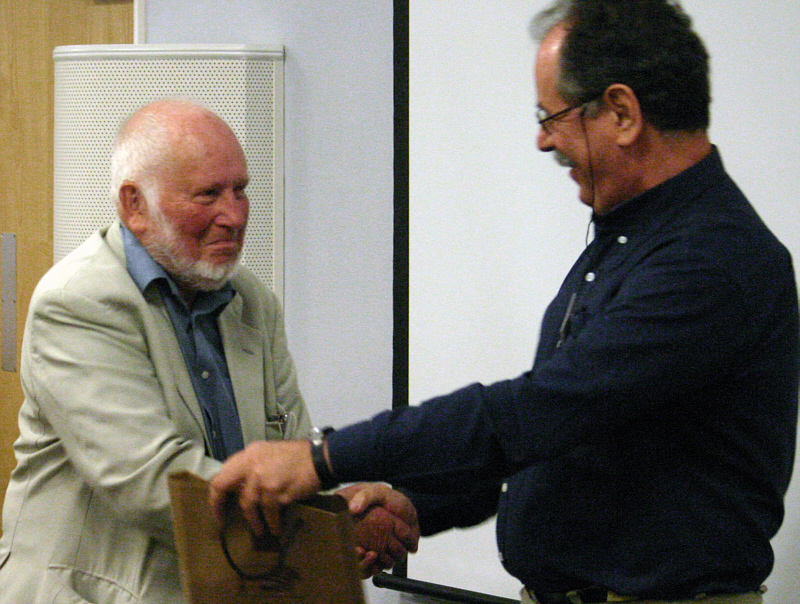
Julian Tudor Hart receives a special award from IAHPE President Alexis Benos at 2009 conference in Coventry In his later years Julian became less confident of his ability to set out an extended and detailed argument in writing, and the last time I met him, for lunch at a restaurant in Swansea in the summer of 2015, he persuaded me to take on the production of a book on the clash between professional ethics and the market, and the problems in developing and maintaining patient-centred care. However, this was just at the point that work began to launch Health Campaigns Together and the task fell by the wayside: Julian’s death is a powerful reminder of the need to return to this task and deliver a book worthy of its originator. Many will miss the inspiration and support we had from Julian, who was a quietly spoken, friendly but steely-willed ally, with a complete commitment to quality health care and a far-sighted Marxist understanding of the contradictions of the health care system that has arisen after almost four decades of efforts to undermine the principles of the 1948 NHS. But he and his work will not be forgotten as long as campaigners fight to defend, reinstate and improve the NHS and health care. John Lister, Co-chair Keep Our NHS Public and Editor, Health Campaigns Together
• • • • • • • • • • • • • • • • • • • • • • • • • • • • • • • • • • • • • • • • • • • • • • • •
Phillip Wearne
Phillip, who died in March 2018, was actively involved in the establishment of Health Campaigns Together, attended a number of affiliates' meetings, and played a very important role in our successful November 4 conference in Hammersmith Town Hall. He will be much missed, and we are pleased that we have now received this appreciation of his work as a campaigner. |
||
|
Copyright © 2025 Health Campaigns Together
| ||
